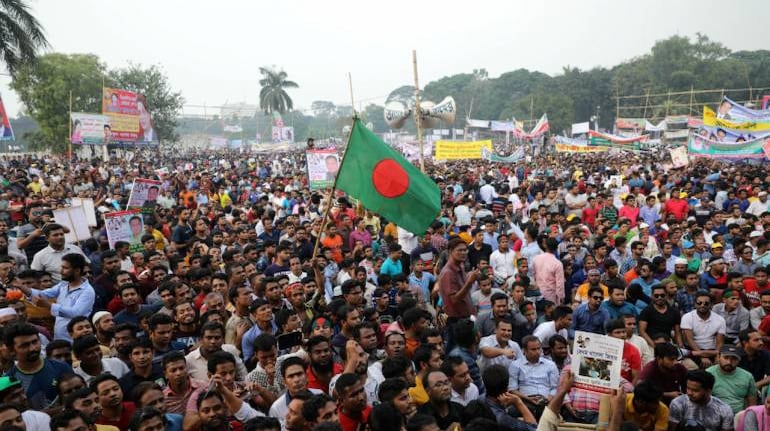



Bangladesh heads for a single-phase general election on December 30 to elect a new parliament. This will be the country's 11th National Parliamentary Election.
In as many as six seats, Electronic Voting Machines (EVMs) will be used for the first time in the country.
Nearly 10.42 crore people are registered as voters, including over 5.16 crore women. Polling will take place in 40,199 polling stations across the country.
While Bangladesh is a Muslim-majority country, secularism is one of the four fundamental principles of its Constitution. Minorities form around 10 percent of Bangladesh's 16.47 crore population. Hindus make up about 8-9 percent, Christians about 0.5 percent, while the remaining are Buddhists.
Here's all you need to know about the polls:
How the numbers stack up
The Jatiya Sangsad (House of the Nation) is the top unicameral law-making body of Bangladesh. It has a total of 350 members, out of which 300 are elected by voting in a first-past-the-post format in single-member constituencies. The remaining 50 seats are proportionally divided among contesting parties according to vote share.
Hence, a political party or a front needs to win 151 seats to win the election.
Parliamentary elections in Bangladesh are held every five years, unless the House is dissolved prematurely.
Key parties and fronts
National politics in Bangladesh has been largely dominated by two parties — the ruling Bangladesh Awami League (BAL) and the Bangladesh Nationalist Party (BNP). The two parties lead the Grand Alliance and the Jatiya Oikya Front (JOF), respectively.
The Grand Alliance is led by incumbent Prime Minister Sheikh Hasina. While JOF's largest party BNP is led by former prime minister Begum Khaleda Zia, the front is being led by Gano Forum party's Kamal Hossain.
The Communist Party of Bangladesh (CPB) leads the Left Democratic Alliance (LDA) comprising of seven parties.
BNP, the main Opposition party, is facing a stiff challenge within as its chairperson Zia is serving a five-year jail term in two corruption cases and is ineligible to contest the polls. Zia's son and acting party Chief Tarique Rahman is in London, possibly evading arrest, reports suggest.
On the other hand, Hasina is seeking to win a third consecutive term in office. It would be her fourth term as prime minister overall.
What happened in 2014
In 2014, the elections were boycotted by the BNP and many other opposition parties giving Hasina's BAL a walkover. BAL retained control of Parliament by winning 234 out of the 300 seats at the time.
The elections were marred by widespread violence. Hasina's government was accused of concerted persecution of its political opponents.
Violence and accusations against the EC
The poll campaign has witnessed violent clashes between the two main sides.
Key opposition parties have been up in arms with the country's Election Commission (EC). They have been demanding resignation of the Chief Election Commissioner Nurul Huda, questioning his neutrality. They have called Huda's behaviour "inappropriate" and said that he was not taking their views into consideration during talks.
According to reports, the US will send 12 teams of observers and fund thousands of domestic volunteers to monitor the election that it hopes will be free and fair.
Around 600,000 police, Border Guards Bangladesh (BGB), Bangladesh Coast Guard, Ansar and Village Defence Party personnel will be deployed to provide security during the polls.
Critics and human rights organisations have raised concerns that Hasina retaining power could push Bangladesh towards being a single-party state.
Opinion poll
According to an opinion, a survey conducted by a non-government research organisation called The Research and Development Center (RDC), the Grand Alliance is likely to win the elections. Grand Alliance and JOF could win 248 and 49 seats, respectively.
Impact on India
Bangladesh and India share a 4,000-km long border that has been marred by ethnic conflicts. Its location is strategically important for India, and China has time and again tried to woo Dhaka. Overall, Bangladesh is a key component of India's "Look East" policy.
Under Hasina's regime, New Delhi has seen improved bilateral ties and boundary disputes have been settled amicably, while strong security cooperation has been established and significant progress has been made in settling differences over the Teesta River water sharing.
Bilateral trade and India's investment in Bangladesh has also picked up.
On the other hand, Zia had a strained relationship with India during her two tenures as prime minister. Her party has been called anti-India by critics and her government was accused of harbouring anti-India elements on Bangladeshi soil.
However, Zia did try to turn the page in 2012 when she called on then President Pranab Mukherjee and PM Manmohan Singh in New Delhi.
Discover the latest Business News, Sensex, and Nifty updates. Obtain Personal Finance insights, tax queries, and expert opinions on Moneycontrol or download the Moneycontrol App to stay updated!
Find the best of Al News in one place, specially curated for you every weekend.
Stay on top of the latest tech trends and biggest startup news.